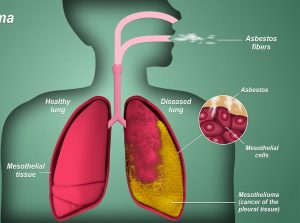 Just before discussing what causes mesothelioma, we will first and foremost talk about what is mesothelioma. Mesothelioma is an uncommon form of cancer that starts in the lining of the body’s internal organs.
Just before discussing what causes mesothelioma, we will first and foremost talk about what is mesothelioma. Mesothelioma is an uncommon form of cancer that starts in the lining of the body’s internal organs.
About 75percent to 80percent of mesotheliomas starts in the lining of the lungs. This condition is referred to as pleural mesothelioma. Mesothelioma pleuralis starts in the chest cavity, It does not begin in the lungs.
Peritoneal mesothelioma develops in the peritoneum, the tissue that surrounds the abdominal cavity. Peritoneal mesothelioma accounts for around 8% of mesothelioma cases.
Rare forms of mesothelioma may also start in the lining surrounding the heart, known as the pericardium, or in the tunica vaginalis, the lining surrounding the testicles.
The duration of survival after a diagnosis of mesothelioma is dependent on a variety of variables, including the patient’s age. Patients diagnosed at an earlier age also live a longer life. Additionally, the form of mesothelioma may have an impact on survival rates. Certain people with peritoneal mesothelioma, in fact, have a tumor that develops very steadily, and these patients often survive longer. Patients who are surgical candidates usually survive longer than someone whose disease has advanced too widely to be extracted surgically.
WHAT CAUSES MESOTHELIOMA
In order to address the question: what causes mesothelioma, we need to establish the fact that mesothelioma is like other forms of cancer. Mesotheliomas, like cancers, are caused by disruption to the DNA in cells. DNA is the material that makes up our chromosomes – the signals that tell our cells how to act. We typically resemble our parents due to the fact that they are the origins of our DNA. However, DNA has an impact on more than just our appearance. Certain genes regulate as cells in the body rise, split, and die. Alterations in these genes can result in uncontrolled cell growth, which can result in cancer.
Exposure to asbestos is the primary source of pleural mesothelioma. Around eight out of ten individuals who develop mesothelioma were exposed to asbestos. As asbestos fibers are inhaled, they migrate to the ends of narrow air passages and eventually enter the pleura, causing inflammation and scarring. This can trigger harm to the DNA of cells, resulting in unregulated cell development. If consumed, these fibers can penetrate the abdominal lining and play a role in the development of peritoneal mesothelioma.
MESOTHELIOMA: RISK FACTORS
Anything that raises a person’s risk of getting cancer is referred to as a risk factor. While risk factors play a role in the progression of cancer, the majority of them do not cause cancer. Any people who have a number of risk factors never get cancer, and those who have none do. Recognizing your risk factors and discussing them with your doctor can assist you in making better lifestyle and health-care decisions.
A person’s risk of contracting mesothelioma can be increased by the following factors:
Getting exposed to asbestos. About 70percent and 80percent of those living with mesothelioma were exposed to asbestos. Asbestos is a naturally occurring collection of minerals present in the earth. Asbestos was once widely used in asphalt, insulation, roof shingles, and other materials due to its sturdy, versatile fibers and fire-resistant properties. Individuals who are engaged in the manufacture of asbestos-containing materials, as well as others who mount or maintain these products, may inhale or ingest asbestos fibers. Additionally, these fabrics may be transported in asbestos dust on clothes or personal belongings, exposing employees’ families to extremely dangerous amounts of the minerals. Current protection laws mandate asbestos workers to wear protective clothing and to wash and change their clothes prior to leaving the place of work
Smoking: Although smoking alone does not raise the risk of mesothelioma, smoking combined with asbestos contamination may increase the risk of some forms of lung cancer.
Exposure to radiation: Radiation treatment, such as when a patient has already undergone radiation therapy for lymphoma, can induce mesothelioma.
Genetics: About 1% of patients with mesothelioma have developed the condition, which means that the chance of contracting it was handed on from parent to child inside a family. Typically, it is caused by a mutation or alteration in the BAP1 gene.
Although certain patients with mesothelioma have no documented risk factors, a large proportion of those diagnosed with the disease have been exposed to asbestos. As a result, it is essential to both use protective equipment and take care while dealing with asbestos.